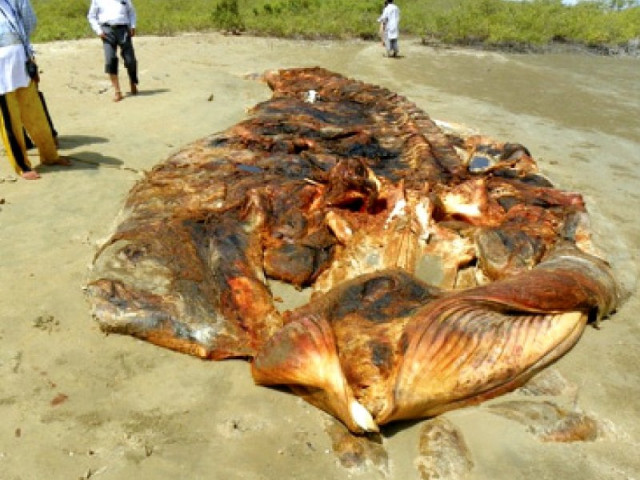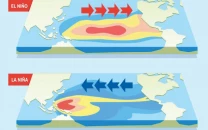Fool’s gold: Fishermen search belly of the whale
Villagers assume that whale would have ambergris, valued for perfumes and medicines.

The Bryde’s whale was found last Tuesday by fishermen of village Damb but by Sunday, only its carcass was left. PHOTO COURTESY WWF-PAKISTAN
Fishermen of village Damb of Sonimani, Balochistan came across a dead 33.3-feet-long adult Bryde’s whale on August 20 but by Sunday, only its carcass was left.
The whale, categorised as a baleen whale, was found deep inside the Miani Hor Lagoon which is about 15 kilometre away from the opening to the pelagic zone - neither close to the bottom nor near the shore - also called the open ocean.
The fishermen of the village claimed that the whale was alive in the Miani Hor Lagoon for a whole day before dying. The fishermen reportedly towed the whale to the southern part of the lagoon, where its decomposed body remains.
According to the experts, in quest for finding ambergris - a substance highly valued for medicinal use and by perfumers to make scents last longer - the fishermen removed a major part of the whale’s belly.
“What they [fishermen] didn’t know was that the substance is only produced in the digestive system of sperm whales - not baleen whales,” said Muhammad Moazzam Khan, the technical adviser (Marine Fisheries) for World Wildlife Fund-Pakistan and former director-general of the Marine Fisheries Department. “The fishermen got an expert to dissect the body and reach the whale’s belly, but they couldn’t have found the ambergris, meaning they unnecessarily mutilated the body of the animal.”
Alarmingly, the practice of cutting the whale’s belly has never been done before, said Khan. “This means that people now know about ambergris, but not the exact details.”
Lost in the lagoon
“These marine mammals seldom enter into creeks and lagoons,” said Muhammad Moazzam Khan, who is also the chairperson of the Pakistan Whale and Dolphin Society and was among those who inspected the whale. “It seems that in pursuit of their prey, which are small fishes found in shallow waters, this whale accidently entered the Miani Hor Lagoon and because of disorientation, it ventured deep inside Miani Hor, lost its way and eventually died.”
The same was stated by Sonmiani Development Organization Chairperson Master Rasheed, who had implemented a project on dolphins in Miani Hor with assistance of the Ocean Park Foundation, Hong Kong. “In most cases, these whales find their way back to the open ocean but sometimes, they become disoriented after entering the lagoon and die,” he said, adding that Miani Hor was very rich in dolphin population but whales were rare visitors to the lagoon.
The whale was found on Tuesday but experts of the WWF-Pakistan, officials of Balochistan Forest, Wildlife, Fisheries departments, environmentalists and local organisations reached the spot and collected its samples for DNA testing on Sunday. “Because of the carcass, there is a strong smell in the area and a large number of flies have gathered around it, which have also bitten the people at the site,” Khan told The Express Tribune.
A rarity
The marine experts said that five species of large whales are found in Pakistan, out of which three are baleen whales - Blue whale, Bryde’s and Humpback - which do not have teeth and feed on small animals and fishes.
Muhamamd Amin, Balochistan Forest and Wildlife conservator, stressed the need for maintaining a databank of whales found alive and dead along the coast of Pakistan. “All cetaceans, including whale and dolphins, are protected in Pakistan and their deliberate killing is punishable by law,” he said.
Social Welfare Officer Muhammad Anwar, who was among the team of experts inspecting the Bryde’s whale, urged that communities be involved in conservation of whales and dolphins.
Experts pointed out that while Bryde’s whales were one of the most common baleen whales found in Pakistan, there was no exact figure of their population in Pakistan.
Khan said that the samples of tissues and bones collected from the whale will be analysed with the help of Institute of Marine Sciences at University of Karachi and will be sent abroad for DNA analysis.
Published in The Express Tribune, August 27th, 2013.
………………………………………………………………………………………………………………………………………
………………………………………………………………………………………………………………………………………


















COMMENTS
Comments are moderated and generally will be posted if they are on-topic and not abusive.
For more information, please see our Comments FAQ